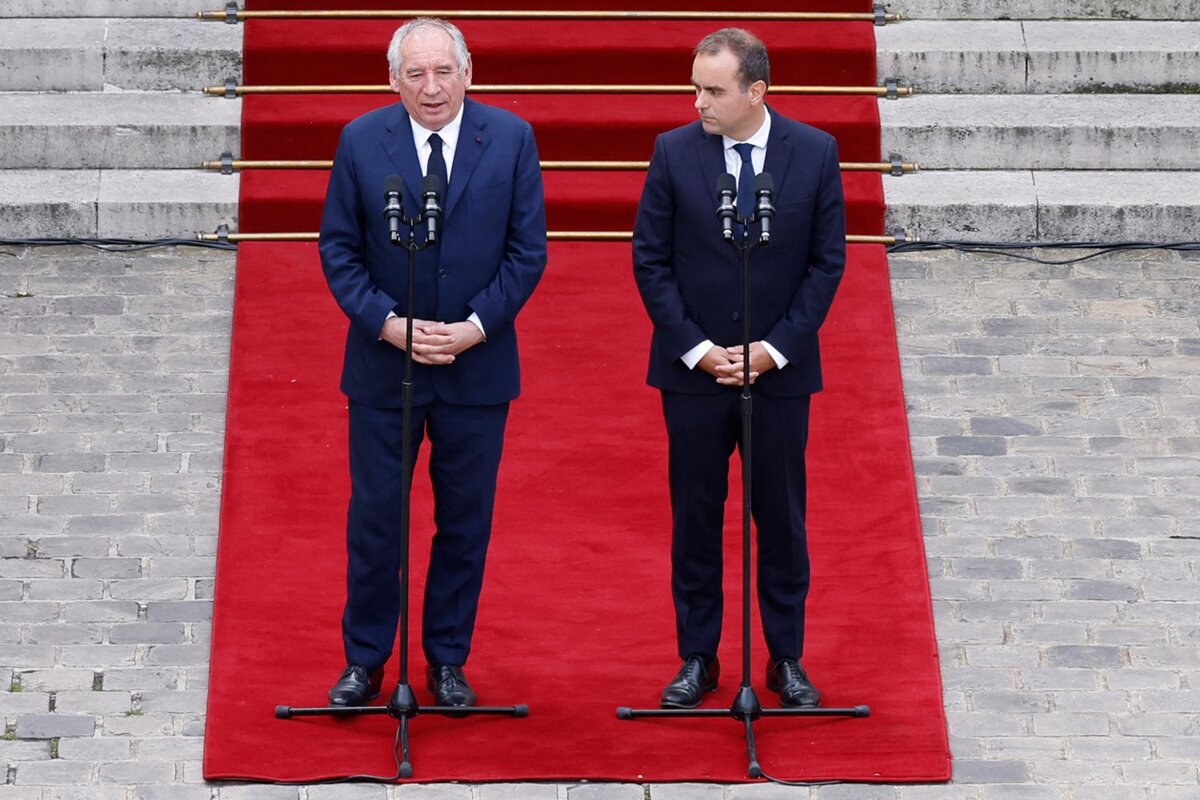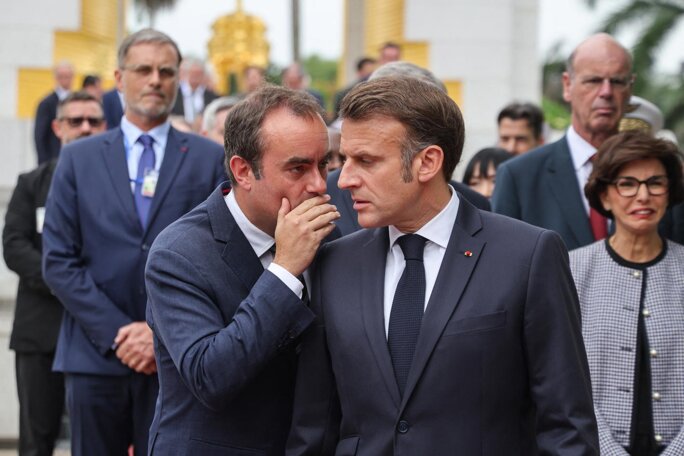Meeting on Wednesday on the red-carpeted steps of the prime minister’s office, the Hôtel de Matignon, it appeared as if there was nothing that could disturb François Bayrou and Sébastien Lecornu from their scripts as they engaged in the official handing over of office.
Twenty-four hours after Bayrou had resigned, the result of losing a confidence vote in parliament, prompting the appointment of Lecornu as his successor, the two men exchanged polite greetings, congratulated each other, smiled and, in their brief speeches, spoke with gravity about the future for the nation. They were seeing eye-to-eye, and promised to help each other. But who were they addressing?

Enlargement : Illustration 1

At the same time, on this day of protest action when the call that began on social media to “block everything” had finally materialised across France, the country was chequered with noisy blockades and demonstrations. The massive and repressive deployment of police forces could not prevent the heterogenous, grass-roots movement from taking to the streets, the expression of a social discontent that no political party has succeeded in claiming as its own. Their placards and slogans were about the funding crisis in the healthcare sector, in education, the housing crisis and wages, about degraded living conditions and the feeling of not being represented. The diverse participants sought to make their voices heard, in expressions ranging in tone from despair to enthusiasm.
But at Matignon, this citizens’ mobilisation was never mentioned, as if it did not exist. The contrast between these two worlds is startling, not to say shocking, and it is telling of the crisis of government into which France has been plunged, and which the French president, Emmanuel Macron, is responsible for.
Macron has knowingly obstructed all the exit points, one after the other, from the institutional labyrinth in which he has placed France. The absurdity of appointing as prime minister Sébastien Lecornu, both a clone of the president and at the latter’s service, who is openly appreciated by far-right figurehead Marine Le Pen, and who is the target of a preliminary investigation into favouritism and conflict of interest launched by the financial crimes branch of the public prosecution services, could not be more manifest.

Enlargement : Illustration 2

The French president’s aim is twofold; to hold on to power until the end of his five-year mandate without ever renouncing the economic policies that benefit the wealthiest of the population, and which he has ardently put in place in the wake of his predecessors. For that, and employing an extremely vertical presidential model, it is clear that he will stop at nothing, whatever the cost. Even if that means snubbing the logic of the nation’s institutional system and the practice which enjoins him to take into proper account the result of legislative elections. On top of this is an acceleration of the process of a fusion of rightwing parties, and which closes in on Macron’s own political camp.
An all-powerful presidential model, and its limits
His responsibility for the current political chaos in France is total. Not only because he alone decided to dissolve parliament in the summer of 2024, at a time when the far-right Rassemblement National party had the benefit of a winning momentum following its success in European Parliament elections. But also because he has continuously refused to take heed of the opinions expressed both in the urns and in popular demonstrations.
Macron learnt no lessons from the results of the snap legislative elections that followed the dissolving of parliament. Firstly, he never proposed the appointment of a prime minister from among the broad leftwing coalition, the Nouveau Front Populaire (NFP), which garnered the most votes. It is true that, despite that, the NPF, because of the mathematics of the French electoral system, did not obtain a majority within parliament, but they were nevertheless in a position to offer an alternative.
Since 2022, the year of Macron’s re-election and the ensuing legislative elections which produced the first hung parliament, when his Renaissance party failed to regain its previous majority, the president’s successive governments have passed legislation either by forming improbable coalitions with other parties or by repetitive use of article 49-3 of the constitution, a decree which allows governments to bypass a vote by Members of Parliament. Without garnering sufficient support in the elections, Macron turned to exploiting – to an unprecedented degree – the authoritarian flaws in the constitution, which gives the head of state the exclusive prerogative of naming a prime minister.
The degree of power exercised by the president has increased in a manner inversely proportionate to his diminishing electorate, and this in contempt of the role of parliamentary parties. With the nomination of Lecornu as prime minister, the all-powerful presidential model has reached its height and also its limits. Macron and Lecornu, who are close friends, are so politically inter-changeable that the president no longer has a shield, as he had with Bayrou (and his predecessor, Michel Barnier, who lasted three months as prime minister), to protect him. The perspective of yet another dissolution of parliament, and even Macron’s resignation, now inevitably approaches, with no alternative for avoiding the one or the other.
While supposed to guarantee institutional stability, Macron's function as head of state hangs by a thread. Yet he continues to use it to exonerate himself over his responsibility in policy-making. It is the second reason – although in chronological terms, the first – for the current political impasse. Macron has never taken into account the massive rejection of his political programmes, and notably that concerning the economy, which are the cause of the electoral routs of his party and its allies.
By appointing as prime minister Michel Barnier, a veteran of the conservative Les Républicains party (LR), in September of last year, and subsequently replacing him after his resignation in December with François Bayrou, from the centre-right MoDem party, and now replacing Bayrou with Sébastien Lecornu, from Macron’s centre-right Renaissance party, the president has maintained a neoliberalist logic common to all three. That includes an increasing scheme of tax breaks for the wealthiest, and the abandonment of public services, while also renouncing on pledges of protection of the environment and access to housing, all of which is mostly to the benefit of multinationals. This is despite the social anger that has been continuously simmering since his first term in office, beginning in 2017. He has appeared impassive towards campaigns for greater social justice, from the so-called “yellow vest” anti-establishment protest movement over living conditions, to the “block everything” movement of today, but also the recurrent popular protest marches against his reform of pension rights.
Bayrou’s proposed far-reaching public spending cuts, justified ad nauseam by warnings over France’s deepening public debt and the threat of punishment by the financial markets (arguments which nevertheless failed to save Bayrou), was the ultimate example of policies that never cease to brutalise the most economically fragile in society – and which leave the better-off indifferent to their plight. No-one doubts that Lecornu will follow the same line, given that he was appointed to allow Macron to end his term in office without ever changing his course on economic and fiscal policies.
In his last address to parliament on Monday, when he delivered a policy speech that concluded with his defeat in a confidence vote, Bayrou told Members of parliament that “you have the power to overturn the government, but you don’t have the power to erase reality”. The reality, however, is that the French economy survived the 2007-2008 financial crisis and those that came afterwards, notably during the Covid-19 epidemic, only through the support of the welfare state, “l’État-providence” in French, financed by citizens and which, at its origins, was designed to respond to their needs.
In France and the rest of the Western world, the consequence of the slowdown in the accumulation of capital was that those who had obtained it sought to limit policies in favour of the redistribution of capital. Under the presidency of Nicolas Sarkozy, and also his successor, François Hollande, reforms of the labour market led to a degrading of working conditions, while fiscal measures favoured business leaders. At the same time, the transformation of the social state led to the abandonment of public services, from healthcare to education, and the ostracising of the unemployed.
Rather than trying to ease the economic and social crisis, Emmanuel Macron has only amplified it by transferring state funds towards the private sector and in turn presenting the bill for the deficit reduction to ordinary working people and, in parallel, public services.
A pre-announced crash of democracy
Such policies, inevitably unpopular, can only lead to a crash of democracy in France. All the more so in that the president has refused to listen to the third message that emerged from last summer’s snap legislative elections. While a large section of the electorate voted to block the far-right RN party from reaching government, he gave the nod to Barnier, and subsequently Bayrou, to rely on the RN for governing. According to the statistics of the National Assembly, parliament’s powerful lower house, since the summer of 2024, the RN voted in favour of 90% of legislation proposed by the now overturned governments.
This alliance was crystalized by the appointment of the recently elected head of the conservative LR party, Bruno Retailleau, as interior minister. Like the far-right, Retailleau believes there exists “paper” French nationals, and calls for the exclusion of headscarf-wearing women from sporting events. He notably delayed his reaction to the murders of Aboubakar Cissé, 22, stabbed to death in a mosque in southern France in April, the fatal shooting in May of Hichem Miraoui, a 46 year-old Tunisan, and Djamel Bendjaballah, of Algerian origin, in August 2024, all of which appeared to be racist attacks.
Retailleau wants to restrict the rights of journalists, and argues for an end to support for renewable energies. Concerning this Tuesday’s “block everything” day of action, he pledged that police would be “uncompromising” in restoring order.
But ahead of Retailleauin entertaing a complicity with the far-right is now Sébastien Lecornu. This former armed forces minister is considered by Marine Le Pen to be “nice”. It does not take a wild jump of the imagination to interpret his appointment as prime minister as a way of again facilitating the support of her party’s parliamentary group for Macron's (new) government. The revelations of Lecornu's secret discussions with her in the spring of 2024 have illustrated her esteem for him.
Since his first term in office, Macron has become convinced that his political survival depends upon his capacity to make the RN the only political alternative to him and his camp, excluding all others, in a choice between "him" and "her". However, his driving of the fusion of rightwing parties, ranging from his own centre-right party to the far-right, is a devastating error of judgement regarding the future of democracy in France. This rapprochement, which has been germinating over several years, has the effect of normalising the far-right, rendering it legitimate and reinforcing it, and runs the risk of paving the way for its arrival in government and the presidency.
Paper barriers are falling down one after the other; xenophobic, racist, sexist, homophobic, anti-social and climaticidal ideas are already present at the summit of power. It simply remains for the RN or its associates to become the occupiers.
-------------------------
- The original French version of this op-ed article can be found here.
English version by Graham Tearse


